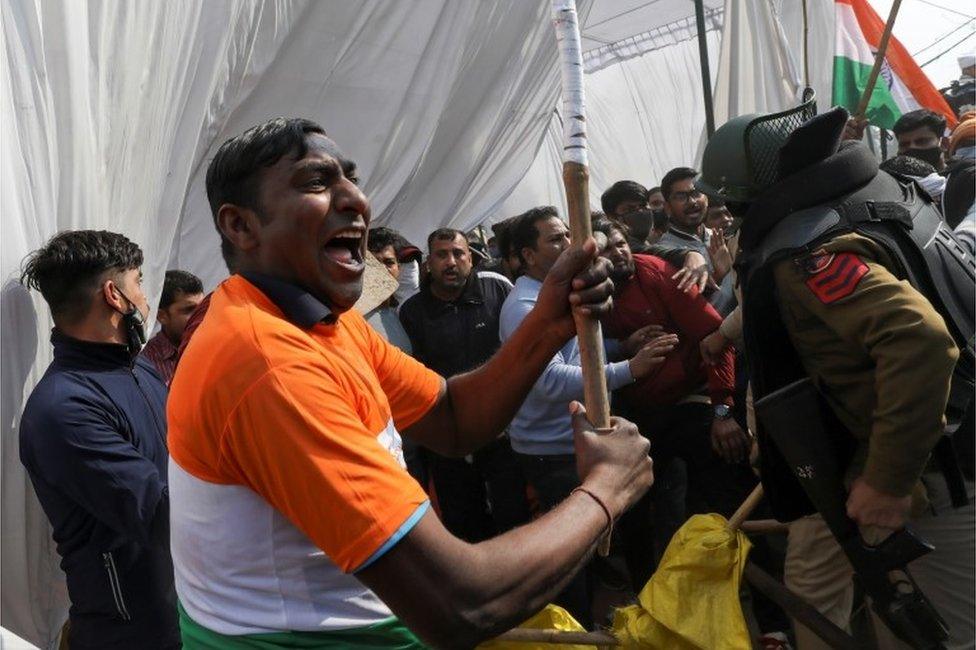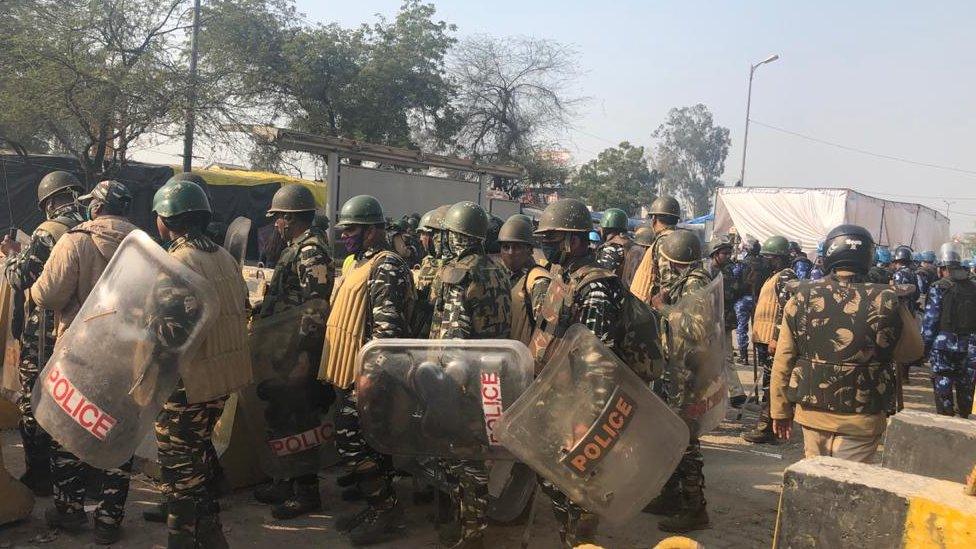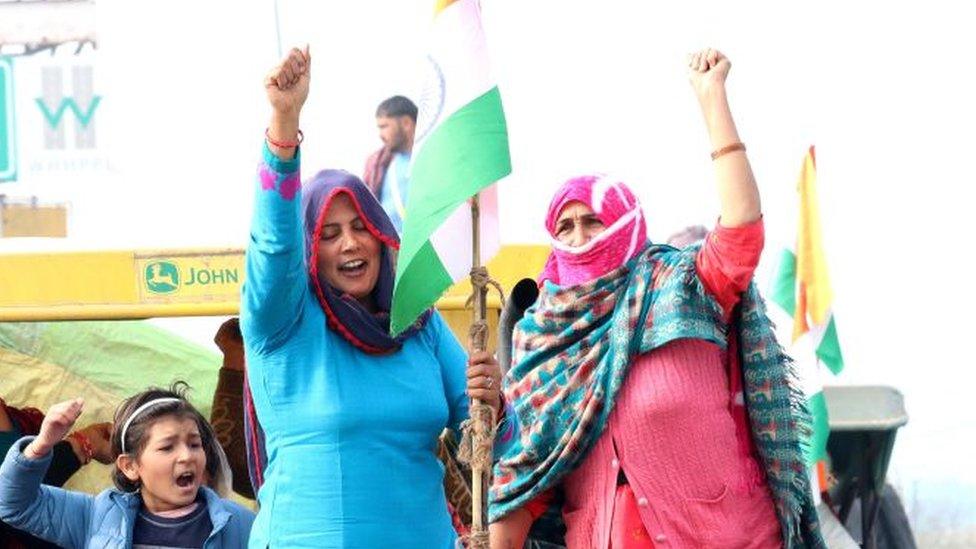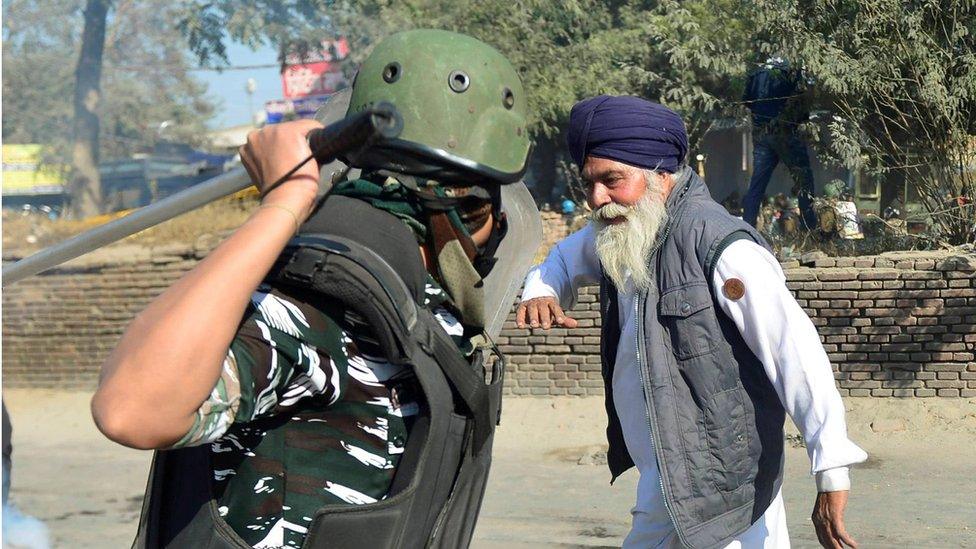Singhu border: Violence at farmers' protest site in Delhi
- Published

Clashes broke out when unidentified men reportedly approached farmers and told them to leave the area
Violence has been reported at one of the sites in India's capital Delhi where farmers are protesting against agriculture reforms.
Clashes broke out at the Singhu border when a group of unidentified men reportedly approached farmers and told them to leave the area.
Some farmers and policemen have been injured in the clashes.
Tens of thousands of farmers have been camping in protest at Delhi's borders for more than a month.
They are demanding that the laws be repealed. The government says its reforms will liberalise the sector, but farmers say they will be poorer as a result. This is one of the longest farmers-led protests India has ever seen, pitting the community against Indian Prime Minister Narendra Modi and his Bharatiya Janata Party-led (BJP) government.
The situation is still tense at the border as hundreds of policemen have now been deployed there, the BBC's Arvind Chhabra reports from the site.
Farmers say that the group of men pelted stones at them and also destroyed their tents.
Police say they are trying to ascertain the identity of the men. Local media reports say the men came from the local area and accused the farming groups of disturbing peace and their livelihood.
The latest violence comes days after thousands of protesting farmers fought through barricades and tear gas to enter Delhi on India's Republic Day.

Hundreds of policemen have been deployed at the Singhu border
Clashes broke out on 26 January after some farmers diverted from the routes they had agreed with authorities to take out a massive tractor rally.
The situation at the Ghazipur border - another site of the protest - is also tense on Friday after hundreds of policemen gathered at the site last night. Farmers said the policemen had come to evict them, but that didn't happen.
Rakesh Tikait, one of the prominent farmer leaders, made an emotional appeal to farmers last night and asked them to join the protests at Gazipur border. Thousands of more protesters have since reached the site.
What do the new farming laws propose?
The laws loosen rules around the sale, pricing and storage of farm produce which have protected India's farmers from the free market for decades.
Farmers fear that the new laws will threaten decades-old concessions - such as assured prices - and weaken their bargaining power, leaving them vulnerable to exploitation by private companies.
While Mr Modi has defended them, the laws have been likened to a "death warrant" by farmer groups.
Are these reforms necessary?
Most economists and experts agree that Indian agriculture desperately needs reform. But critics of the government say it failed to follow a consultative process and did not take farmers' unions into confidence before passing the laws.
For one, the bills were put to a hurried voice vote in parliament, leaving little time for debate, which infuriated the opposition. And state governments, which play a crucial role in enacting such legislation, also appear to have been left out of the loop.

Hundreds of women farmers have joined the protests
Experts also point out that the reforms fail to take into account that agriculture still remains a mainstay in the Indian economy.
More than half of Indians work on farms, but the sector accounts for barely a sixth of the country's GDP. Declining productivity and a lack of modernisation have shrunk incomes and hobbled agriculture in India for decades. The government, meanwhile, provides farmers with generous subsidies, exempts them from income tax and crop insurance, guarantees a minimum price for 23 crops and regularly waives off debts.
"Now the government is saying, we will get out of the way, and asking us to deal directly with big businesses. But we didn't demand this in the first place! So why are they doing this to us?" Rakesh Vyas, a farmer, told the BBC's Soutik Biswas recently.
Experts say any attempt to dismantle decades-old concessions must happen through dialogue because otherwise fear and suspicion will derail the process.
Related topics
- Published2 December 2020

- Published28 January 2021